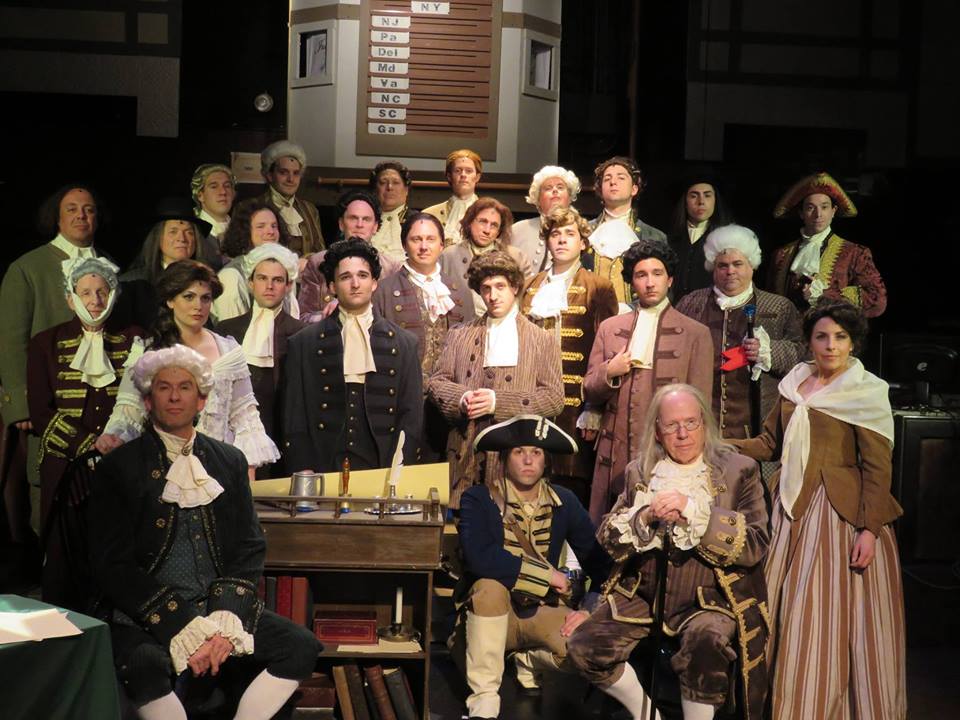Hey, hey! Momma, look sharp. For you might just find two of Toby’s cast members of their current production of 1776 sitting down with TheatreBloom to talk about Independence Hall from the inside out. In Part Two of Inside Independence Hall, we sit down with Matthew Hirsh and David James to discuss the importance of the battlefield briefs being delivered to congress as they debate on the most important decision of our country’s history.
If you could give us a quick introduction of who you are and some of your area credits, we’ll get right to it.
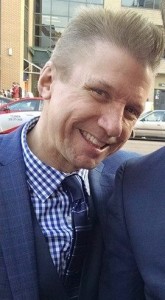
David James: Well if your readers don’t know me by now, I’m David James. And I’ve been at Toby’s for longer than I can even remember. But recently, I just finished up playing Grandma Addams in The Addams Family, before that it was Robertson Aye in Mary Poppins, a reprisal of my role as sergeant of the police and an ensemble pirate in Pirates of Penzance and way back last spring I had the character track— Historian, Not-Dead-Fred, Prince Herbert— in Spamalot. Now I’m here playing Andrew McNair, congressional custodian.
Matthew Hirsh: Let’s see if I can do this right. I’m Matthew Hirsh and I play the Courier in 1776. Going backwards, I was most recently Caveman Addams, one of the Ancestors—
David: Oh, Caveman!
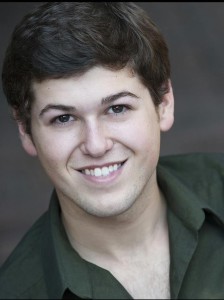
Matt: Oh, Grandma. I mean— Urgh grrah grrah. And then I was Mr. Northbrook and in the ensemble for Mary Poppins both of those were at Toby’s. Before that I was Tony in West Side Story at Riverside Center Dinner Theatre, and Frankie in Forever Plaid, also at Riverside Center Dinner Theatre.
What was the general appeal to want to be involved with 1776? And what was your relationship with the show prior to being cast in the current Toby’s production?
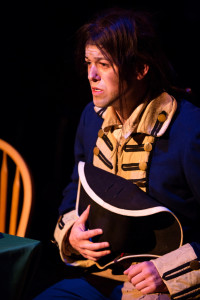
Matt: This might come as a surprise to everybody, but I’m actually a huge history nerd. Yes I am, from Colonial Times all the way back to Ancient Greece I just love it. So I already had a historical connection to it just because I enjoy the time period and I enjoy studying things from that period. I have also played many soldiers in my day as an actor. It’s a long string. I’ve done several marines, I was a marine in Miss Saigon at Signature Theatre. I also played a marine with PTSD in a New York Musical Theatre Festival reading called Standby. And throughout various acting experiences during school I’ve been a lot of different soldiers.
David: I had fond memories of doing it at Burn Brae Dinner Theatre back in 1990 were I was the Courier. I’ve been trying to get Toby to do this show for a long time. I thought it would suit her theatre very well being in the round and being so intimate. Finally she got the rights because Ford’s was holding onto the rights for many, many years, and they finally let them go. So we got to do it and I really wanted to be involved in some capacity. Originally I had asked to direct the show, but then I turned that offer down because I really wanted to be in it rather than just take a turn with it directorially.
Tell us a little bit about Andrew McNair and the Courier and how they fit into this story.
David: Not much is known about Andrew McNair just from doing the research on him. He actually was a custodian for the congress for 18 years. He was there for quite some time during the writing and the signing of the Declaration of Independence. His jobs entailed ringing the bell— as you know, they say that in the show “McNair, go ring the bell.” And then he gets to pass out the rum, light the candles, all the basic day to day activities that a custodian would have. I find him very interesting because he was a common man, so he was interesting because he got to sit back and listen to the way that history was being written down and developed. He was a bystander. I show reverence every day for the Courier, I don’t know whether anybody notices this or not, but when those stuffed shirts are just sitting there making fun of him or talking about him, I always stand because that could be my son. That Courier coming in from the front line could be someone I know from home because he’s from that era where the common man was the front line.
Matt: I did not know that!
David: Every show, every entrance. I’d say look, but you can’t exactly look. But I do.
Matt: So the Courier as a part is technically just a fictional character and the directors (Jeremy Scott Blaustein and Shawn Kettering) gave me some leeway to decide what my name would be and things like that. My name is Henry Miller and I’m the son of a farmer. I am from Watertown, Massachusetts as it says in the script. Henry trained as a minuteman in the colonial militia. He was at Concord, that’s what I’ve decided his first battle was. He’s a 15 year old boy who’s just innocent, who isn’t ready to be a real soldier, but he wanted to play war and he got it. He had no idea what he was in for.
So David, Matthew has the solider experience in his repertoire, but this is unlike anything you’ve ever done before, right?
David: Well actually I was thinking about that because you know I did Thènardier in Les Mis and he was an innkeeper who passed out the rum. And then there’s Robertson Aye who was a servant guy, a man of the serving class. So in that respect it’s similar. But I’ve been thinking about the Courier, with the dispatches he was delivering from the front lines. If you think about it, he was almost like social media, reporting on the day that it was happening. The difference is it would take him time to travel by horse to get there. But he was still presenting the news from the front line, which I think it was amazing that they had that level of contact and information regarding what was actually happening out on the field.
You two are the only members of the show, the women excepted, who are not members of the Congress. What is it like to witness the proceedings as an outsider and how are you internalizing that to incorporate it into your character?
David: It’s interesting because you sit there listening to them debating back and forth with the yeas and nays, what you stand for verses what you don’t stand for, and what you find to be right or wrong. And you yourself, or McNair, has opinions about what is right and what is wrong. So I find myself listening and in my mind I’m weighing in. There’s a conflict at times because when I hear the debate going back and forth I know that this is my belief but then I hear somebody say something that makes perfect sense and I ask myself, “why don’t I feel that way?” So it’s very, very interesting to stay in tuned with what’s going back and forth, the volleyball session of what’s going back and forth.
You know, McNair gets so wrapped up at what’s going on with the debate, I mean he’s been there for 18 years day in and day out watching what’s going on, he’s been there longer than many of the younger and newer members of congress, he feels like he’s one of the guys. He even says “I don’t know how I feel about The United States being the new name for the new country.” And in that moment he forgets he’s not one of them despite being with them. And the congress doesn’t care what he thinks, they think he’s a nobody. But it’s really interesting because he’s there serving them every single day and it becomes so easy to forget that he isn’t one of them because he’s such an integral part of it, so I think in that moment he does feel like he can speak up and voice his opinion like he is a part of the congress. He’s presenting his cause, and his case, but they quickly remind him that he has no place there. So he goes back and sits down. And I go back and sit down. I’ve become John Adams for that moment, sit down, David!
What about you, Matt? You don’t get to observe as much of the back and forth and the debate because you’re only in congress a few moments at a time and you don’t really stay when you do come in.
Matt: That’s true. Most of my entrances are just to deliver the Courier’s letter. But there are times when I look around at the congressmen and the underlying tone in my head is, “what do they actually do in congress?” Here I’ve just come from the battlefield and I’m seeing the actual war, and I walk into this room full of men sitting around fanning themselves. It seems like they’re not doing much. In reality they’re actually laying the foundations of our country to be and I think I personally realize that later on when I stick around to see what’s actually being said. Other than that it’s just in and out and I don’t really get to see what is going on.
That’s a perfect segue because I do want to talk about that moment that leads into your song. The congress has left and you’ve arrived, but then you stay and you sing what is often described as the song of the show. Can you talk to us a little bit about the song?
Matt: So “Momma, Look Sharp” is the song. And I know that David can probably attest to this because he also played the Courier, and I’d actually love to hear what he had to say, but I want to start with the struggles first. Some of the more obvious ones being that I’m not 15 years old, I’m 23. So just pulling back to be a younger voice in speaking and singing can be tricky. But the struggle I had with the song itself is the arc of it. I am envisioning my friend dying as I sing this song. It does get emotional throughout the song. The problem I have with it, with me visualizing my friend dying, is that I’m the one saying his last dying words, and now I’m imagining what he was going through at the time. I don’t think the Courier got a chance to say goodbye to his best friend as he was dying. They’re in war so there really just wasn’t time for that sort of thing and that’s that.
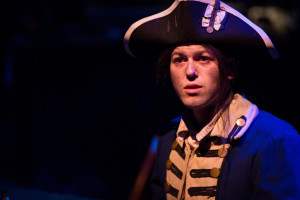
As far as how the song arcs, it starts playfully almost. These young boys were ready for war to play soldier, not to be soldiers. As the song progresses you get a taste of the reality that has been forced upon these kids. I think that’s really where the Courier, or at least how I play it, that’s where he gets choked up because all of that is coming back to him all at once. The only reason he even thought about it was because someone asked him if he saw a fight. And he’s seen plenty. Far more than someone at his age should have seen. And that all just kind of swamps him and it becomes very emotional.
David, how old were you when you played the Courier?
David: I think I was 28. When I did it at Burn Brae Dinner Theatre, which was not in the round, it was proscenium. And I think for me it made the staging of that number just a little bit easier because I stayed seated in John Adams’ chair the entire time and there was a candle lit on the table beside me. There was a lot of reverence resonated in that moment because I was just able to sit there and visualize while singing. But of course we’re in the round, so Matt has to make sure that everybody gets a chance to see you when you’re singing. I think when I did the role I didn’t know it, but I see it now. With youngsters, there’s that— they think they’re invincible that nothing is ever going to happen to them. They believe it, “nothing is ever going to happen to me, I’m out here being a soldier and it’s fine.” But then when you’re forced into it, because a lot of times the children were not signing up for this, they were forced to it. So when they start seeing their friends die, they lose that innocence and the realization is “this could happen to me too.”
You, or myself when I did the part 25 years ago, we’re on the front lines. Our job is running back and forth, seeing all the devastation that was happening and we’re reporting on it. I always thought, as the Courier, that I read the dispatched when I was en route.
Matt: Ooh! That’s interesting!
David: It’s one of those things where it’s supposed to be sealed information. Now, we never had proper sealed props at Burn Brae, they were folded up pieces of paper. I know the ones at Toby’s have a stamp with a seal on it. But I always thought that I was reading them as I was approaching congress before I would deliver the news. It was very, very chilling to me as an actor knowing what the Courier was reporting. You only see what’s going on you don’t really know what’s going on.
Matt: That is a very interesting way of looking at it because we do have the sealed letters in our production and the thought had crossed my mind. I’ve played with the notion of whether or not the Courier knows what’s being delivered once he hands that letter over, you know does he know the bad news and the extent of it? He can’t be completely ignorant because he’s watching his friends die, but does he know the wording, does he know how bad the situation really is and how hopeless Washington is becoming? It does make a big difference in how you enter and just cross to give a letter, whether you know that it contains bad news or you have no idea what’s going to be said. That’s really an interesting concept to play with and now I want to play with it some more.
David: It’s also interesting having sung the song in 1990 and 25 years later I’m singing the backup harmony for it. I have Leather Apron (AJ Whittenberger) there, also. And just before that song we have this conversation where he says he’s aiming to join up, and I say to him, “What are you talking about? You’re in the congress.” And he asks what that means and I say “Well you don’t see them rushing off to get killed, now do you? But they are great at finding others, which means it could be you but you’ve got this job here, so you don’t have to because you’re here.” Now when I sang it, our Leather Apron and our McNair couldn’t sing so they canceled out the backup vocals and it was just me all by myself.
Matt: I will say this, I am a little interested as to why the Courier’s harmony goes lower in those lines. I mean he’s supposed to be a 15-year-old boy…I know that’s how it’s written, I guess that’s a question for Sherman Edwards.
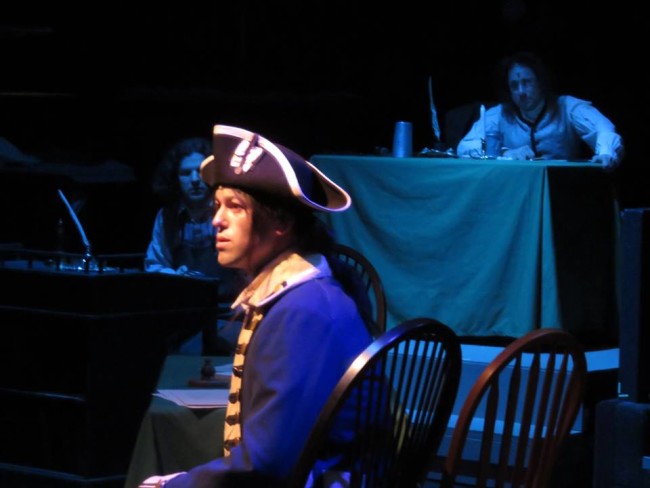
David: Getting back to those harmonies, there is actually a moment that I love when we’re singing those harmonies to you, Matt. I always look at the Leather Apron as he’s under my wing, even though we have no connection with each other whatsoever except for the occasional glance, or I had him something, or move him along to do something for me. This moment happens in those harmonies where we are singing together, and I look at him, and that look says “this could be you on the front lines but you’re here safe and secure.” It’s a very nice moment for myself.
Matt: See this is beautiful for me to hear all of this because I had no idea. At this point in the song, after the trio, at that point in the song, it’s nice to know that you’re sharing that moment with Leather Apron— well actually I don’t know if you’re sharing that moment with Leather Apron or not—
David: No, he has no idea we’re sharing it because he’s standing in front of me. But basically I take a glance to him, and then I look back at you. It’s a very tiny thing, probably not even noticeable, but it’s a personal moment for me.
Matt: Oh so that’s a personal moment for you! That’s really wonderful to hear that! Okay, so at that point in the song, you have your really touching thing happening, what I’ve chosen to do with it, during the trio? I’m actually envisioning, not a burial, but watching the best friend pass. I’m seeing that imagery in front of my eyes. He dies, and I have to keep moving. Now that I have this moment, this is the first time I’ve sat down on stage— now lord knows I’m sitting down backstage— but the Courier does not sit down, except on a horse and that’s not just sitting. This is the first time that the Courier gets to sit down and take a breath. That’s when all the things that you’ve shut out come back to you, and in real life too. It gives you time to think.
David: The twelve performances that we’ve had so far? They’ve all been dead silent. You could hear a pin drop. Even with the kids groups.
Matt: No one has made a noise. It’s a profound moment, the Courier finally sitting down, before he starts talking about what he’s seen.
Now this can apply to you as well, Matt, though I know you have not had the extensive history with the Toby’s stage as Mr. James here has. This show is very different from anything that Toby has ever put onto her stage just because of the ratio of acting and dialogue to music and song. What has that been like, especially given that your experience, David, is as the “song and dance man” of Toby’s?
David: Actually, it’s been very refreshing because it’s something different. It could be said that it is a play with music. I love that because it gives people a chance to show what they can do in the acting field. Watching people’s characters grow over the course of the twelve weeks that we’re doing this, it will be very interesting to watch.
Matt: I can actually answer that question a little bit, though you are absolutely right, I cannot account for the 28 years that David has put in at Toby’s, mostly because I don’t even have 28 years on the planet. But I am a musical theatre person. It is difficult to answer, though. The Courier role is almost like two separate shows for me. When you deliver letters you have a mission. You’re on a mission, you don’t slow down, you can’t stop and if something stops you it’s startling. The second show is the “Momma, Look Sharp” scene. That’s the moment where you get to see that there’s more going on than just a soldier. I think that might be a huge thing, I know this digresses a little bit from the question, but I think it’s very important for the congress to see a soldier. They’re sitting in a room, and they don’t really know. Until Jeffrey and Andrew and John (Jeffrey Shankle playing John Adams, Andrew Horn playing Samuel Chase, and John Stevenson playing Ben Franklin) go to New Brunswick to see the army with the war council, none of them know what their army looks like at all.
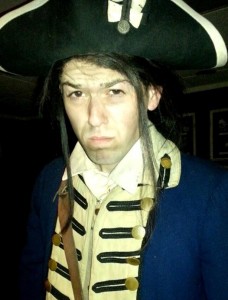
I’m dirty. I’m ragged. I’m tired. I’m Heath Ledger from the Patriot.
David: Do you think you’re the only Courier that services congress?
Matt: Probably not.
David: I mean you’re talking about 1,200 and some odd number of dispatches. That’s a lot of dispatches.
Matt: Yeah, I definitely don’t think I’m the only one. I don’t even think I’ve been George Washington’s Courier for that long. I think that’s why the Courier can take that moment of “I’m interested in what’s happening because I’ve never seen it before.” I’m sure that whatever Courier came before this one did stick around a couple times, but it was not when the declaration was being made, so it probably was not as interesting for him.
What is the defining moment in the show for your or for your character?
Matt: Well, I hate to spoil your day, but it’s actually not “Momma, Look Sharp” like I’m pretty sure most people think it is. That isn’t what the show is about for the Courier. The song is a very touching song, it’s very emotional and it is in my head. But that’s not what life is, that’s a moment of sadness. It’s not the epitome of what he does. I think the moment that really makes it for him is actually two moments, one that sets it up and then the one that follows, both with Jeffrey actually.
The set up is when everyone is gone and I don’t know who to give the letter to and Jeffrey steps up to the plate. But the acme of Courier-ness comes when I share a look of understanding and thanks with Jeffrey for being the only person to believe in me as a soldier, to believe in the army, and to give us anything. We have been without ammunition, arms, food, and clothing for months now. And it seemed like congress wasn’t going to do anything. Without Adams we would have died and we would have been done. So that’s the moment that really means everything to me as a soldier in the show. We’re saved because of John Adams.
David: My moment actually comes in the second act. We’ve been through so many votes at that point. I actually take the position of moving the “yea/nay” board very personal because that’s my territory. So my moment is when I see every single one of the states in the “yea” category. It’s weird because in my mind I’m like “look what we’ve done” even though I had nothing to do with it because I’m just the lowly custodian of the congress. It is a moment for me because I know what went into it. I know what it took to get to that place. I know the frustration on both sides. It is something that everyone has finally come to agree on and I know that it is going to make a difference in the world. That to me is an amazing thing, look what we’ve done even though I was only a part of it by moving the “yeas” and “nays” around.
Matt: But you do a lot more than that.
David: I know, I mean in his mind. In his mind, he’s just the custodian. He’s just responsible for rum, he’s responsible for candles, and windows. But the vote-tally board, that’s a powerful thing. He gets to move the yeas and the nays. That’s a really powerful thing.
What has doing this show taught you about yourself as a performer?
Matt: It’s definitely the next installment in a long line of scene/songs that I’ve done that require being able to get to a certain amount of emotion. Today I discovered that, and I don’t know if it’s just with this song or getting to that level as a performer in general, but it is a very thin line between letting the emotion take over and using it to my advantage. I hope to really fine-tune that over the next couple of days, or months. No, not months. I’d rather get that done before we close, obviously. But it’s an emotional tight rope. If you let the emotion take over, lord knows I don’t want to be sobbing on stage and not getting through my lines.
David: Unless it’s honest.
Matt: Unless it’s honest. But I think I mean toeing that line of living the moment of the emotion and not getting bogged down in the potential of emotional mire that comes with something that is this heavy. Live with the emotion not in it.
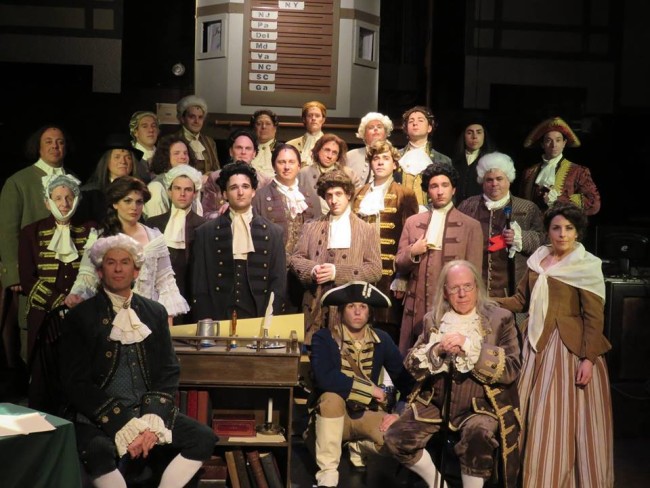
David: For me, and we’ve talked about this before, it just resolidifies that it does not matter who you are in the show at all, because the art of performing is something that I truly love and cherish. For me, it does not matter. I could be the lead, I could be the support, I could be silent. 15 lines, 115 lines, no lines; I love every chance I get to be doing what I love most. I love it. I truly enjoy every minute that I’m on stage and this show has just solidified that for me.
If you were to be one of the founding fathers, who would you be?
Matt: Hmm. That’s a tough one. Not John Adams…
David: That little brat? He just wants to get his way! But thank god we had him, because he ended up swaying everybody to independence. And that was a huge important thing in getting our nation to where it is today, but I still don’t want to be him. Well, wait, are you asking about who we’d want to be in the show? Or for what reason? Like in history?
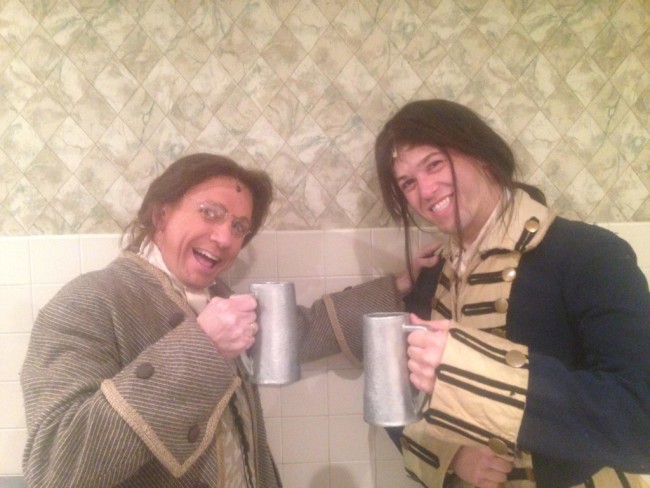
You can interpret that in whichever way you’d like to. Director Jeremy Scott Blaustein said he wanted to be Ben Franklin because Franklin gets the most laughs, he invented the stove and he gets to be on the $100 bill.
David: Oh! That’s who I was going to say! I’ve changed my mind…I don’t know…who do you want to be?
Matt: I don’t know. This might be the hardest question you’ve asked yet. If I could be any founding father?
David: Okay. I’m going to go with Reed.
I’m sorry, which one is Reed?
David: See? He’s George Reed, the one from Delaware who makes us go back for Caesar Rodney. But no, I don’t want to be George Reed. I’m going to have to go with Roger Sherman. No, not Roger Sherman. Who would I want to be as a founding father?
Matt: I want to be Andrew McNair.
David: He should be a founding father!
Matt: Or at least a founding uncle. Someone should deserve credit for keeping congress liquored up. But while he’s debating, I have an answer. This is tricky. I want to be Franklin without the French Disease and the gout. He was a brilliant inventor. He definitely made strides in technology that we wouldn’t have if he wasn’t’ a man who lived when he did.
David: I think I would like to be Jefferson because…I don’t know. This has honestly got to be the worst question you have ever asked me. And I’ve done four interviews with you now! I have no idea what founding father would be my cup of tea. I don’t want to be John Adams, he’s obnoxious and disliked. Everyone wants to be Franklin. Jefferson— oh oh oh! I know who I want to be! I want to be Wilson. James Wilson of Pennsylvania. The one who has to make the decision. I want to be him, and you know me, but I want to be him because in the theatre everybody thinks “it’s all about you” and for me personally that’s the farthest thing from the truth. If I could make it anything but, I would love to. But because I’m on stage it becomes all about you. And I love being on stage but I don’t want it to be all about me. He doesn’t want to be remembered and I completely understand that.
Why comes and see 1776 at Toby’s?
David: I think it’s a really good production. It looks good and everybody in it does a really great job. I think it’s well cast.
Matt: Well for starters, why not? It’s a fantastic show. It has information and it’s educational. It’s not exactly what happened in history but we don’t deviate. This show has such a phenomenal cast of characters on and off stage. The chemistry of the entire group together, we all have our days, we all have our ups and downs, but when we came together for the first rehearsal? Someone told a joke and everyone in that room laughed and you felt like you had just heard a joke in congress. We all came together and it feels like we are the entity of congress. The laughter, when people are angry at each other; this show has all that and you can see that on the stage in the moment. Acted wonderfully, sung beautiful, and I’m not talking about myself, I mean every person in that cast.
What is it that you are hoping that audiences are going to take away from seeing this production, especially given the current political climate?
David: It’s what our forefathers were fighting for all those years ago and it’s what we’re still fighting for today. It’s a reminder. It shows us where we were, how far we’ve come, and how much further we still have to go. It’s a reminder. It’s just a message: open your eyes. The fact that we are still debating the same things that we were debating way back when and that all of their issues are still relevant? It’s sad but it shows as a nation, as a people that we still have such a long way to go. And that’s coming from McNair. I’m not even one of the founding fathers.
Matt: He’s the founding Uncle. The cool founding uncle that brings you candles and rum. But I have to agree. I concur. I concur but I have to put my own spin on it, because Courier there and Courier Jr. here, or Grandma and Caveman which poses the chicken-egg question…if I’m Caveman Addams how did Granny play the Courier three years before I was born? But anyway, going to school in Washington DC got me really involved with a lot of poly-sci friends. A lot of people in my generation have this in vain idealism, and it’s unfortunate that it’s in vain, but it’s about these topics in 1776 that should have changed forever ago. They should have been fixed forever ago, there shouldn’t be problems. What I want audiences to take away from this show, not from me, but from the entire show is that we have to work together to figure out how to fix the problems. They’ll figure it out eventually. People should take away from 1776 that it is about working together as one whole United States of America. I’m running for president.
1776 plays through July 5, 2015 at Toby’s the Dinner Theatre of Columbia— 5900 Symphony Woods Road in Columbia, MD. For tickets please call (301) 596-6161 or purchase them online.
To read Part 1 of Inside Independence Hall: An Interview with Co-Director Jeremy Scott Blaustein, click here.

